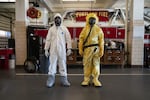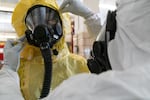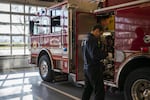It’s become a common cautionary tale among first responders.
With no goggles, masks or gowns, firefighters in the Seattle suburb of Kirkland, Washington, unknowingly raced again and again into a nursing home that would soon be recognized as one of America's earliest coronavirus epicenters. It was only later that all the reports of pneumonia and breathing struggles were understood as symptoms of the highly infectious disease -- at which point, more than 27 first responders had potentially been exposed.
A month later, COVID-19 has shifted to the front of mind for first responders, but similar stories continue to crop up nationwide. Last week, in Washington, D.C., officials announced three firefighters had tested positive for the virus. In San Jose, California, that number climbed to 13 as of Friday.
As the outbreak grows, so does the danger to Oregon's first responders. In the coming weeks, paramedics, police officers and firefighters will be asked to not only continue on with their pre-pandemic role, but many will have to take on the added risk of transporting infectious patients to the hospital.
The new duties have fire and police chiefs scrambling to put measures in place that ensure their first responders can continue to work and don't themselves end up patients.

Emergency dispatchers in Portland will now try and ask callers about out-of-state travel, known exposure to the virus and any symptoms they may have. If the caller seems like they may have contracted COVID-19, firefighters might choose to wear either of the two protective suits, worn above by Kevin Leonard (left) and Bozeb Beckwith (right).
Jonathan Levinson / OPB
“It's been a bit overwhelming,” said the Oregon State Fire Marshal’s chief deputy Mariana Ruiz-Temple last Thursday, adding she hadn’t had more than a few hours of sleep per night since the crisis began. “A lot of late nights and early mornings over the last three weeks.”
A new rulebook
The implications the coronavirus would have for the state's 11,000 firefighters, who often double as EMTs and paramedics, have been clear to Ruiz-Temple since Feb. 26. That's when the Centers for Disease Control and Prevention discovered what they believed could be America's first instance of community spread — a case that couldn't be traced back to a trip abroad, or an interaction with an infected person — near Sacramento, California.
More than 500 miles away in Salem, Oregon, Ruiz-Temple saw the new stage as a sign of the potential caseload on the horizon. Within four days, the fire marshal convened the fire service’s coronavirus response team, charged with making sure hundreds of fire departments in Oregon had what they needed to stay protected for the long haul.
“The reality is that we are not immune. We are not special in any way,” said Deric Weiss, fire chief for Tualatin Valley Fire & Rescue. "We can contract the virus as much as the next person."
Emergency dispatchers across the state said they are now trying to tip off first responders not just about the 911 call they’re racing toward, but the health of the household. Callers reporting medical emergencies in the Portland region will be asked about out-of-state travel, known exposure to the virus, and any symptoms they may have, such as fever, coughing or shortness of breath. Depending on the likelihood that the caller is a COVID-19 patient, the first responders will wear varying levels of protective gear: This could range from masks, goggles and gloves to hazmat suits.
The dispatch questions are not foolproof. In at least once instance, Weiss said, a caller failed to flag a person with common coronavirus symptoms. He added it’s possible the caller didn’t hear or understand the questions -- or thought by answering yes they were condemning themselves to a slow response time.
Related: Seattle Nurses Scrounge For Masks To Stay Safe On Pandemic's Front Lines
“It's actually one of my biggest messages that I'm trying to spread right now,” he said. “Just be honest when you're calling for care so that we know exactly what we're getting into.”
Some cities are also asking firefighters to do a second verbal screening on the drive over or at the patient’s doorway, if they think they have the time.
“We just slow everything down, right?” said Portland Fire & Rescue Chief Sara Boone. “We call people back, we get more information. There's multiple, multiple levels that we can continue to triage a call.”
More changes to dispatch could be on the horizon. Rich Chatman, a spokesperson for the fire bureau, said Portland is anticipating an influx of 911 calls as people who have caught the coronavirus pile on top of those who have misdiagnosed their seasonal flu, allergies or food poisoning as the coronavirus. To keep the delicate 911 system reserved for those who are critically ill, Chatman said the bureau is considering a new “text triage system” in which people would text in their symptoms and the system would, in turn, provide “individual instructions” based on their level of illness.
“When you're in a scenario where you have to triage hundreds, if not thousands, of people, we need to be able to identify the sickest people quickly,” Chatman said.
While firefighters and paramedics will bear the brunt of these medical emergencies, police officers will also be at risk of exposure to COVID-19 — albeit less directly.

Firefighters Bozeb Beckwith and Kevin Leonard demonstrate the hazmat gear Portland Fire & Rescue might wear when treating potential coronavirus patients.
Jonathan Levinson / OPB
“It would be more of an unknown exposure,” said Bend Deputy Police Chief Paul Kansky. “Whether it's in an arrest or going to a domestic disturbance.”
To reduce the risk, police departments are trying to limit face-to-face interactions. Portland has barred the public from two of its three precincts. Crime victims are being asked to report over the phone instead of at the station. In Bend, police officers have been told to relax on minor driving infractions, so there’s less contact through the driver seat window.
“We’re still out there every day,” Kansky said. “And we’re trying to maintain that resource as this gets worse, so we actually have a healthy staff here to work.”
Hurdles on the horizon
Despite the reforms, police and fire chiefs still look into the future and see themselves hampered by potentially dire shortages: of tests that would allow first responders to know quickly if they’ve been infected; of firefighters or emergency medical staff, if too many are forced to quarantine; and of protective equipment.
This was the first problem Ruiz-Temple noticed after convening her task force. The Oregon Health Authority has a stockpile of protective equipment, which it distributes to the state fire service. But with the fire service competing with medical facilities for precious gear, Ruiz-Temple said it was soon clear that not every county’s request for equipment would get fulfilled.
“I can tell you that the requests that come in are far more than the inventory we have in Oregon," Ruiz-Temple said. "And so there are some tough decisions being made by some smart people about priorities."
Josh Santos, the medical service chief for Clackamas Fire District # 1, said firefighters will likely see “critical shortages” down the road, specifically with their supply of N-95 masks. They’re now considering reusable breathing apparatus masks, which, he notes, makes first responders “kind of look like Darth Vader.” He also said just because one piece of equipment is available currently, it doesn’t mean it will be down the road.

Portland Fire & Rescue is the state's largest provider of pre-hospital care. Rich Chatman, a spokesperson for the fire bureau, says firefighters are bracing for the 911-calls to increase and trying to figure out how to hone in on those callers who are critically ill.
Jonathan Levinson / OPB
“It's just about rationing everything and taking a little bit more of a global approach,” Santos said, “because no one product is gonna last this.”
Masks aren't the only resource first responders are struggling to get their hands on. When it comes to getting a COVID-19 test, those on the front lines have no more strings to pull than a layperson. Firefighters and police officers must turn to their doctor like everyone else. Well, almost everyone else.
“Somehow they find tests for NBA players to be tested, but they don’t find enough for first responders,” said Daryl Turner, head of the union that represents Portland police officers.
Other cities have tried to speed up testing for those on the front lines. Seattle has opened up a drive-through testing site for first responders. In San Jose, they receive priority testing.
Turner said he worries without enough testing, first responders could become unsuspecting carriers of the disease.
Related: As COVID-19 Spreads, Calls Grow To Protect Inmates In Federal Prisons
“What happens is we could be bringing it back to work,” he said. “And not only are we impacting our coworkers, we’re impacting our families. We're also impacting a large part of the community that we serve every day.”
Without easy access to testing, there’s also concern departments could be quarantining healthy officers, needlessly culling the ranks of already stretched-thin agencies. In Kirkland, Washington, almost a third of the firefighters had to go into quarantine after entering the nursing home. After three firefighters tested positive in Washington D.C., more than 200 first responders went into quarantine.
Ruiz-Temple said she hasn't heard of a report of firefighters in Oregon who have tested positive for COVID-19. But about 30-40 have quarantined as of last week -- a number she said is not yet critical, but could likely grow with community spread.
